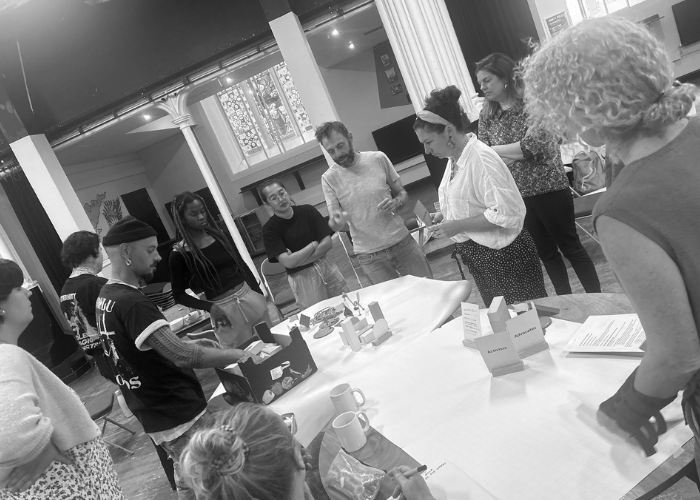
At Citizens for Culture, we are keen to explore engaging ways to understand how the regional cultural ecosystem works, how its many parts connect, and the many different roles stakeholders play in shaping it.
Play:Disrupt are a creative studio designing playful, participatory experiences that help people explore complex systems, spark collaboration, and imagine new possibilities together.
We asked Play:Disrupt to design a game that would help Assembly members understand how the regional cultural ecology works, how it connects with other systems, and the roles and responsibilities of each set of stakeholders.
In our model, these stakeholders are grouped into five key categories:
Authorities, e.g. Combined and Unitary
Advocates, e.g. Funders and Investors
Associates, e.g. Culture Sector Partners
Activists, e.g. Community Partners
Allies, e.g. Business and Development Partners
The Trinity team were the guinnea pigs for a game testing session which took place at The Trinity Centre last month. The session was fun, full of laughter and learning, and a brilliant opportunity to test what we’ll deliver at the first official Assembly session in September.
At the end of the session, we caught up with the Play:Disrupt team to tell us more about their work and how their game design is developing. Here’s what they had to share:
Play:Disrupt were invited to develop and deliver an engaging, accessible activity for the first session of the Citizens’ Assembly for Culture. The aim was to introduce participants to the West of England’s cultural ecosystem in a way that made it easy to understand how organisations and individuals connect, and who does what in the sector. We were also asked to support participants in identifying key actors (funders, organisations, venues, artists, freelancers, infrastructure staff, and production/tech roles) while exploring challenges and opportunities across Bath & North East Somerset, South Gloucestershire, Bristol, and Somerset.
The result of the workshop needed to be visually engaging and feel like a map that everyone taking part had created and could refer back to during the day. Ideally, participants would remember the experience and how it looked throughout the Citizens for Culture programme, and feel a sense of pride in having made something together.
After an initial meeting with the team, we devised and trialled a workshop at Trinity in July with the mission of learning what worked and what didn’t and perfecting the activities ready for delivery on September 14th.
We worked with the Citizens for Culture team to create an engaging experience that promoted active participation and fun. Participants embodied one of five stakeholder groups and developed a cultural activity based on a recent experience.
One group focused on the Bristol Harbour Festival, discussing how their characters could contribute to its success. The other group took a “devil’s advocate” approach, exploring ways to counter negativity and secure funding from the council leader by appealing to his vanity!
Both groups shared their insights afterwards, reflecting on what could have been improved, which helped refine the workshop ideas.
Games and the invitation to play allow people to engage with complex systems in ways that relate to their lives and experiences. Once people have relaxed and become absorbed in activity, they seem more open to understanding topics, landscapes, and systems that initially seem remote or disconnected.
What surprised us most was how differently the groups approached the task. One became very involved in making the event and creating something visually appealing, while the other grappled with difficult questions and challenges. From this, we were able to iron out wrinkles and now have a much clearer idea of how to prepare facilitators, props, layout and materials for the workshop day.
Once you engage people actively in play, barriers are broken down. It’s all about active engagement and encouraging a playful mindset. Our practice is built through years of making interactive street performance, play interventions, and embedded community engagement. The skills needed to encourage people to play together in public transfer really well to civic participation. Our observations and experiments are backed up by decades of international research into play, game design and psychology. We know that active engagement leads to deeper conversations, and play is a surefire way to actively engage and immerse people in the topic.
We are really excited to see how our workshop plays out in September and feel immensely privileged to be offering participants their first opportunity to take part in a collective activity. We hope people have a lot of fun and gain a deeper understanding of the cultural landscape in the West of England, helping the project to involve ordinary citizens in decision-making.
Our aim is to widen engagement, especially with communities that’ve been overlooked. Active engagement empowers participants, encourages collaboration, and allows more voices to share the stage. The Citizens for Culture programme fits perfectly with our ideals; we need to ensure people from all walks of life are empowered to have a voice in civic decision-making, as it enriches the cultural fabric of our cities and ensures that places and services reflect the communities they serve.
Thanks to Emma and LaToyah for inviting us to develop this with you in an open and collaborative way.Learn more about Play:Disrupt by heading to their website.
Privacy Policy | Cookie Policy | Terms and Conditions | Contact Us | Site infomation